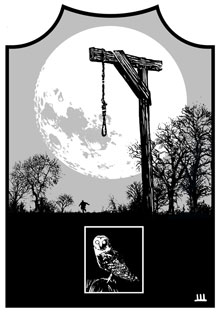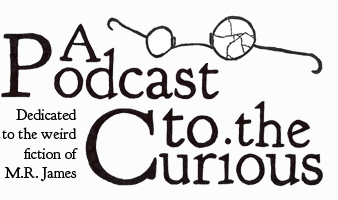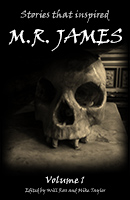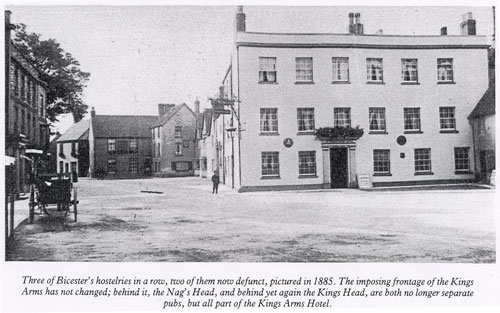 It’s Christmas Special time again! This year Will & Mike look at the one and only M.R. James story actually set during the festive season, ‘The Story of a Disappearance and an Appearance’.
It’s Christmas Special time again! This year Will & Mike look at the one and only M.R. James story actually set during the festive season, ‘The Story of a Disappearance and an Appearance’.
This episode also features a Christmas Bonus in the form of an interview with film director Stephen Gray whose new adaptation of ‘A Haunted Doll’s House’ is available to watch online for a limited period only, starting Christmas Eve!
Our reader this week was Peter Ross and the accompanying artwork is by Alisdair Wood.
As mentioned in our interview, Stephen would like our listeners help deciding which story to film next! Please state your preference below.
Show notes
- Story notes by Rosemary Pardoe (Ghosts & Scholars)
The ever-reliable Ghosts & Scholars website features some useful notes on the more perplexing terms used in this story. - Punch and Judy (Wikipedia)
For those unfamiliar with Punch and Judy shows, Wikipedia gives a good explaination of this peculiar form of traditional entertainment. - Fuseli’s ‘The Nightmare’ (Wikipedia)
In this story the writer compares Punch’s face to that of ‘the vampyre in Fusili’s foul sketch‘, a reference to the creature in Fuseli’s painting ‘The Nightmare’. - Bicester, Oxfordshire (Monty’s World)
Rosemary Pardoe tells us that in the original handwritten manuscript for this story the town called ‘B—‘ in most printed versions is actually given as ‘Bicester’. Bicester is a market town in north Oxfordshire. - Chrishall, Essex (Monty’s World)
The first letter in this story is addressed from ‘Great Chrishall’. There is no ‘Great Chrishall’ in the UK, but there is a ‘Chrishall’ and a ‘Great Chishill‘, both near Essex’s border with Cambridgeshire. - Professor Bert Codman and ‘Toby’ (Punchandjudy.com)
Mike mentions this fellow in the podcast, one of the famous Codman dynasty of Punch and Judy performers. Apparently Bert died in 1969, just two days after the death of his beloved dog Toby! - Photos of Bicester (Facebook)
Will took a trip to Bicester to have a look around the various locations which feature in this story. Photos from the trip can be found at our Facebook page.
The image below shows the King’s Head/Arms inn which features in this story, as it looked in 1885.
Podcast: Play in new window | Download
Subscribe: RSS
Tags: Alisdair Wood, Bicester, Christmas, Christmas Ghost Story, Christmas Special, Ghost Story, King's Head, M.R. James, Montague Rhodes James, Peter Ross, Punch and Judy, Stephen Gray, Story of a Disappearance and an Appearance









That is quite an impenetrable story, but I’m glad I have this podcast to help me!
Two Doctors is…well, to be honest, awful. Should be interesting to see what you two make of it.
And I gotta say, I would absolutely love to see The Willows adapted into a film, it’s perfect. I’ve never heard of Stephen Gray before, but I’m glad I have now – I would very much love see his adaptation of Rats, it’s one of my favourite stories (depsite the lack of any rats at all whatsoever).
Another excellent podcast. But Stephen Jones’ messing about with the punctuation in the otherwise excellent new “Curious Warnings” certainly does throw up some very irritating and unneccessary changes to James’ meaning. See the first sentence of the revised “Oh Whistle and I’ll come to you, my lad”, where an inserted full stop makes the remark of “someone not in the story” sound a bit patronising toward Parkins.
I believe I read somewhere that Stephen Jones had returned to James’s original manuscripts to inform the punctuation changes he made, so in theory the new versions could be nearer to what James originally intended than the versions we are more familiar with. I say ‘could’, it is hard to know what part James had in the changes made between original manuscript and original publication, which could have been at his suggestion or his editors.
One thing I do know is that James would not have approved of the omission of James McBryde’s illustrations, which he insisted on in the original publication of ‘Ghost Stories of an Antiquary’!
Agreed–McBryde was a very dear friend of his from what I’ve heard.
Isn’t the whole story patronising toward Parkins?
I never thought so. Despite making Parkins out to be “something of an old woman”, he also goes out of his way to say his principle attribute was pluck. It’s part of why I don’t like the adaptations: they always reduce Parkins to a shivering wreck who cannot function. While he’s definitely scarred by his experience, I never got the impression he was irrevocably damaged beyond repair.
Ah, at long last! I’ve been waiting for this episode ever since the podcast started, just to see if anyone can figure out just what’s going on here. Glad to see it puzzles the guys as much as it did me.
I figured the puppeteers killed Uncle Henry, and that Uncle Henry came back at the end for his revenge. But the details and motive of the murder were left so murky and vague that I was sure I was missing something. Apparently not.
Another fine episode,since the first program the backing music and various ambient sounds have been great and i have at times wondered what certain pieces are.
The question i want to ask concerns the sounds at the beginnings of both christmas programs (Count Magnus and this one)right after the needle scratches of the records we hear a sort of rhythmical repetitive sound,this sounds to me like the start (after the titles) of Polanski’s “The Fearless Vampire Killers” when the polanski character and Jack macGowran are racing through the snow in a horse drawn sled on a moonlit night..Could i be right? I have wondered about this this the first Christmas show,
Best Wishes Lachlan
Hi Lachlan, apart from a few pieces in the first two episodes when we were just finding out feet, all of the music has been created by me! There is a soundtrack album on the way, I’m just struggling to find time to finish it along side working on stuff for whichever episode is coming next.
In answer to your question about the christmas sound effect, sorry to disappoint but that is a looped ‘sleigh bells’ sample I found on some public domain sound effect website!
A soundtrack!?
Ooh!?
You have piqued my interest, sir! You have a buyer in me already!
Wow, really all the music! I didn’t realize til I read this. Well done. It’s marvelous.
I really enjoyed this episode. I had read the story several times struggling get to the bottom of it, and you’ve certainly helped me appreciate it more. I also had no idea it was set in Bicester, which is close to where I live.
I think this story (Disappearance and an Appearance) would make a great animated short. Any adaptation by necessity involves some rewriting, and this story would benefit from more explanation. The Punch and Judy scenes, especially the dream scene, could be very creepy if done in the style of Jan Svankmajer.
Here here. If the guy who made the Haunted Doll’s House short does it, I will pelt him with money.
A agree that this one is tricky to follow, but always found “Two Doctors” fairly straightforward. Looking forward to you guys doing “An Experiment”; that’s the one I find tough to understand.
I simply took the Punch and Judy men to be part time robbers and thieves who had happened across wealthy uncle Henry and done him in as part of a robbery! It was after all this period that led to the formation of the Metropolitan police, the first organised police force in the country. The Bow Street Runners and parish constables were not up to the job of protecting people in an increasingly violent period; after the return of battle hardened soldiers at the end of the Napoleonic Wars many of whom turned to robbery and violent crime as a result of a lack of employment for them.
Further to this, dare I say that some travelling folk in history have plied both a “legitimate” trade of entertainments of some kind coupled with criminality, the ability to move on as part of that trade acting as a useful way of avoiding the local law enforcers such as they were, particularly in the period the story is set in.
As a side note I do find the dream scenes deliciously dark and malevolent, really bizarre and disturbing.
Yes, it’s a curious one, isn’t it? Not his best in terms of structure, but some of his most extreme moments of creepiness.
Listening to your podcast I thought of another possible interpretation, which is that rather than having cut Uncle Henry’s throat, possibly Kidman and Gallop had him savaged to death by their dog? After all, the story does make quite a lot of play out of the dog – it’s mentioned as important before we ever see the show, our narrator notices that it’s absent from his dream, it then runs away when the ghost of justice seems about to show up, and as his throat is described as ‘horribly mangled’, that sounds like a maul. Since the story keeps mentioning the dog, maybe it was trained to do more than do tricks in the show…
We hadn’t thought of that! Great idea. I was imagining a Toby dog like this:
https://www.google.co.uk/search?q=toby+dog+punch&client=safari&hl=en&source=lnms&tbm=isch&sa=X&ei=MqhyUYKHGamM7QaRyoCwCQ&ved=0CAgQ_AUoAQ&biw=320&bih=416#biv=i%7C7%3Bd%7ColJv5vZU7R7X_M%3A
Derek Jacobi’s audio book of this story really brings the innkeeper to life.
One thing that interested me was the ambiguity about how many men fled from the Punch and Judy show-box. W.R. says:
“The whole show-box fell over backwards; kicking legs were seen among the ruins, and then two figures–as some said; I can only answer for one–were visible running at top speed across the square and disappearing in a lane which leads to the fields.”
Apparently enough people got the impression of two running figures that it takes a while for everyone to realize where the other performer is when he isn’t in the chalk pit. This left me with the idea that Uncle Henry pursues the running guy into the chalk pit. In some of M.R. James’ other stories the lower classes seem to have more perception of supernatural things, so that could be why W.R. completely misses the suggestion of a second figure pursuing the fleeing man.
Great podcast! As Mr. Punch would say, “_That’s_ the way to do it!”
This is a creepy one. It helps that I’ve always considered Mister Punch something of an infernal feature, with his curly twisted had and hook nose and curving violent chin, and his “I just did something unspeakable with your dirty laundry” expression. It doesn’t help that there’s a baby-eating crocodile and a cheery cast of pals like the skeleton, the hangman, and Satan himself.
The puppet show is part of society’s twinkle-eyed endorsement of male violence.
Plus those puppets are just so effin creepy. ._.
So yeah, not very far to go in order to make this terrifying and creepy.
I assumed, motive-wise, that the performance had driven the men “art-crazy” and that they’d become so obsessed with the violent performance that they took to reenacting it with live humans.
[…] ‘Rats’ short film by Stephen Gray (Vimeo) This gorgeous-looking short film adaptation of ‘Rats’ is a real treat. If you want to learn more about the director, listen to our Interview with him in Episode 21. […]
Another great podcast!
I really liked this story, and thought the dream sequence was particularly grim. For my part, I assumed what the narrator saw in the dream were events that actually took place (or were soon to take place). Because of this, I took the Punch and Judy crew to be a roving band of killers. Perhaps they were acting out the Punch murders in real life, killing a baby, an foreigner, etc. This may explain why the Bow Street guys get involved; they’re hot on the trail of serial killers who leave bodies in fields with their heads covered in a sack (but killed in “varied methods”). When they leave the story, we don’t know if they are to head “to London or not,” because they won’t talk publicly about they case(s) they are in the middle of investigating.
As for the cheese incident, doesn’t cheese give English people nightmares? It doesn’t give us nightmares here in the States.
But what’s the deal with that owl?…
Laughed about the cheese remark, Nate! I just took the cheese incident to be the same sort of minute detail of order for the innkeeper that makes the skip in Mezzotint leap up out of the chair when his master arrives. It’s an element of what is considered right or wrong in their jobs and they are acutely aware of it when the rules aren’t obeyed.
Owls– if you’ve listened to the podcast of After Dark in the Playing Fields by now, you’ve already got a very good discussion of the meaning and use of owls in MRJ’s stuff.
Looks like I’m a little late to the party here, I’m just catching up with all these podcasts. I’ve listened to most of the really famous classics and am working through the more obscure ones – of those, this is by far my favourite so far. In fact the nightmare about Punch may be my favourite passage in all James, along with Mr Carswell’s kiddie-terrifying show in Casting the Runes.
For me the opaqueness only adds to the mystery, and correct me if I’m wrong but is this not the only James story that’s structured around someone pursuing a missing person, which has become such a cliche in horror since but which is often so effective (The Wicker Man for instance)?
Some James stories may be more satisfyingly structured, but for pure weirdness and delicious macabre detail, I’d say this is up there with his best.
After an initial reading of MRJ’s collected stories, ‘The Story of an Appearance and a Disappearance’ especially leaps out at me. I find this a superbly macabre tale, with what I think is some of MRJ’s very best comedy and horror writing – a difficult blend to pull off. For me, ‘the malice of inanimate objects’ finds its apogee in MRJ’s highly disturbing presentation of the creepily malevolent, glove-puppet figure: Punch.
I am surprised ‘Appearance/Disappearance’ is not held in higher esteem. I disagree with Rosemary Pardoe’s dismissive evaluation of it as ‘one of his lesser tales’. Anyway, the podcast episode got me thinking about ‘the cheese incident’ and, also, a possible motive for the murder of Uncle Henry.
Beginning with the curious incident of the cheese on the breakfast table, I think Mr. Bowman is upset with Eliza because he himself wished to place the cheese on WR’s breakfast table as a way of making amends to WR for speaking disparagingly about Uncle Henry, unaware he was addressing the missing Rector’s nephew.
At breakfast, the morning after his awkward first meeting with WR, Mr. Bowman says to his servant girl: “you can leave the room, Eliza, I will see the gentleman ‘as all he requires with my own hands.” Perhaps Mr Bowman also thinks that Eliza is not dignified enough to wait on a ‘gentleman’ of quality.
As to why Uncle Henry was murdered, the argument that the puppeteers murdered Uncle Henry is unsatisfactory, because it doesn’t lead us anywhere. We know so little about the puppeteers, that we cannot really say or speculate anything about them. A more compelling interpretation is that Punch murdered Uncle Henry in an audacious inversion of dream and reality. If we read MRJ’s story closely, I think this is where the author wishes to lead us; but, in this particular analysis, we must begin at the end.
In the penultimate paragraph of the story, WR [the unnamed narrator] abruptly informs us that the puppeteers’ real names were Kidman and Gallop; Foresta and Calpigi were merely pseudonymous, Italianate, stage names. But, earlier in the story, WR dreamt that ‘the names over the front of the Punch and Judy booth were Kidman and Gallop’.
So, at the end of the story we discover that WR’s dream was, in fact, an eerily precise premonition. It gave him verbatim information that was borne out in reality. To further clarify this unusual fact, WR says that the names Kidman and Gallop ‘were certainly not what the bagman told me to look out for’ when he first heard about the travelling Punch and Judy show, the night before his dream.
Also, at the end of the story, once the truth about the puppeteers’ real names has been revealed, WR states: ‘no one here seems to know anything about them.’ So, nobody in the village knew the names ‘Kidman and Gallop’ right up until the story’s end. Therefore, the only way that WR could possibly have heard the puppeteers’ real names was in his dream. This leaves us with a fascinating puzzle: how should we treat the rest of WR’s dream? What is stopping us from accepting WR’s entire dream as an actual depiction of what really did happen to Uncle Henry?
It is worth mentioning that WR is generally at pains to stress the uncanny reality of his dream: ‘The baby—it sounds more ridiculous as I go on—the baby, I am sure, was alive. Punch wrung its neck, and if the choke or squeak which it gave were not real, I know nothing of reality.’ So, if the reader has sufficient justification for interpreting WR’s entire dream as far more than just a dream, but possibly the actual turn of events, what can we say has happened and why?
Perhaps, while walking back to his Rectory from across the fields, Uncle Henry was abducted and transported into Punch’s macabre dream theatre to wage a war of faiths, a kind of theomachy: Uncle Henry’s Puritanism versus Punch’s Anarchic Paganism. Throughout the story, MRJ seems to be setting these two up against one another as perfect, almost metaphysical, adversaries. And, indeed, their fight sequence within WR’s dream is an epic, closely fought battle.
Uncle Henry is an austere traditionalist, a classic authority figure, with ‘more than a little of the martinet in his composition’: a ‘martinet’ being ‘a person who demands complete obedience, a strict disciplinarian’. Uncle Henry’s stubborn clinging to old-fashioned attire, wearing the ‘bands’, strongly suggests he is a dyed-in-the-wool, stick-in-the-mud traditionalist. His generally unaffectionate interactions with other members of the village suggests a dour, humourless strain of Puritan severity.
Punch is diametrically-opposed to all of this, as an exuberantly, anti-establishment figure in his stage performances. Modern audiences also miss the fact that, in earlier times, Punch also harangued and killed a Christian minister. Nowadays, Punchmen puppeteers or Professors, as they are colloquially known, are far more likely to lampoon bankers. But, back in the day when the church wielded enormous social influence, Uncle Henry would have made a perfect adversary for Punch to destroy.
An obvious criticism to this interpretation is that Uncle Henry is a human being whereas Punch is merely a glove-puppet. However, MRJ seems intent on dissolving this boundary within WR’s hyper-real dream: ‘all pretence of this being a puppet show had vanished. Punch was still Punch, it is true, but, like the others, was in some sense a live creature, and both [Punch and Uncle Henry] moved themselves at their own will.’
And, as I have said, from the way events unfold, we cannot simply dismiss WR’s vivid dream as merely a surreal fantasy.
Anyway, I hope my thoughts are of some interest to you and season’s greetings!
Working on some translations of James shorts [into Greek] and really have this silly question in that one. Mr W.R. writes in the very start of hisletter:
“[…] accordingly I
propose to go to B– by this afternoon’s
mail, reaching it late in the evening.”
So what’s the thing with traveling by… mail?
Was that a commin thing in Victorian era? Is is just a slang for train or whatever?
Thanks in advance my Bridish Lads.
Hi S.P., the ‘mail’ in this context does indeed refer to a train. Britain used to have railway post offices to allow mail to be sorted on-route (https://en.wikipedia.org/wiki/Mail_train). However I’m not sure whether these trains doubled as passenger trains, or whether these trains were just so ubiquitous that ‘mail’ just became another term for any train.
Indeed, I see your point. As I found later these days, it could be a coach too. People used to travel by post coaches (it costed slightly more, but was faster, and given the emergency of the character, it makes sense). At any rate, according to wiktionary, “mail” back then could stand for: “A stagecoach, train or ship that delivers post”. So it seems quite open. Thanks for bothering to answer.